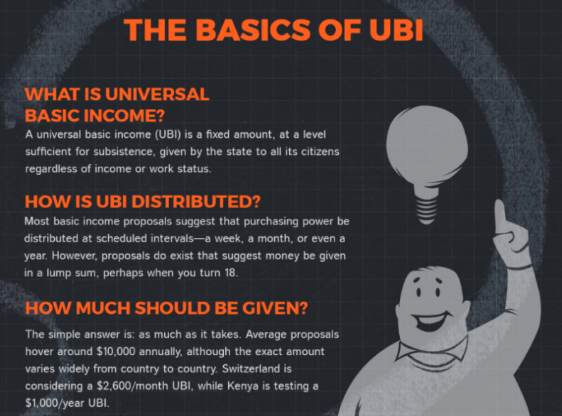Devon Voice Debate (1) – Universal Basic Income For Devon? (Part III)
THE RAPID ADVANCEMENTS in both Artificial Intelligence (AI) and Robotics has made many people fearful about their future – especially when it comes to employment. For, as this report notes – https://home.bt.com/tech-gadgets/future-tech/9-jobs-overtaken-by-robots-11364003046052 – around 35% of the jobs we do today in the UK could go to robots by 2034. The obvious question here is that with over a third of all jobs disappearing, how will people be able to live?
To try to answer this question Devon Voice – The Voice Of The National Liberal Party In Devon – is reproducing an article by Brian Bergstein from MIT Technology Review – see the original here https://www.technologyreview.com/s/611418/basic-income-could-work-if-you-do-it-canada-style/ – which looks at the introduction of a trial system of Universal Basic Income in Lindsay, Ontario, Canada. The Universal Basic Income (UBI) is generally understood to be a guarantee from the government that each citizen receives a minimum income which is enough to cover the basic cost of living. The UBI is also designed to provide financial security – particularly in the not-to-distant future where it can offset job losses caused by technology.
This is the third and final part and should be read directly on from from part 1: http://nationalliberal.org/devon-voice-debate-1-–-universal-basic-income-for-devon-part-1 and part 2 http://nationalliberal.org/devon-voice-debate-1-–-universal-basic-income-for-devon-part-ii As always, debate is free with Devon Voice & the NLP. Therefore, we’d appreciate your views on this article (and the idea of Devon introducing the UBI) when it appears on either the National Liberals Facebook site – https://www.facebook.com/groups/52739504313/ – or the National Liberal Party Facebook site – https://www.facebook.com/NationalLiberalParty/ One big worry for us is that governments could use UBI as a means to ‘control’ people. Therefore, National Liberals must think long and hard as how any future UBI is paid. Maybe this’ll be the subject of a future Devon Voice debate?
It goes without saying that there are no official links between Brian Bergstein, MIT Technology Review, Devon Voice and the National Liberal Party. Please note that Devon Voice has kept the original North American spelling and phrases as they are.
.
Basic Income Could Work – If You Do It Canada-Style (Part 3)
A Canadian province is giving people money with no strings attached – revealing both the appeal and the limitations of the idea.

A simple US graphic which explains Universal Basic Income (UBI). Rapid advancements in Artificial Intelligence and Robotics will see more jobs disappear. Therefore, Devon Voice asks: How will we take care of our workers when there’s no work?
After all, she says, Canada does many other things to strengthen its safety net and reduce inequality. For one, it has universal health care. School funding in Ontario is primarily allocated at the province level rather than being heavily dependent on local property taxes, as it is in the US. Canada also traditionally spends about 1 percent of its GDP on workforce-development programs, according to the Organization for Economic Cooperation and Development. That’s about half of the proportion in other advanced countries, but it still dwarfs the US figure, which is about 0.3 percent.
Funding a different mind-set
Tony Tilly is the outgoing president of Fleming College, which specializes in preparing people in Kawartha Lakes for careers in both white-collar work and trades. About half the students don’t come right from high school; they’ve already been in the workforce and hope to learn a new skill.
He supports a basic income because he thinks it could help people break out of poverty that has beset their families for generations. But even if the program continues past the three-year trial period, Fleming’s essential challenge would remain: how to prepare students for a world in which more and more tasks are being automated.
Fleming is still priming its graduates to work in traditional strongholds of the regional economy: jobs tied to the environment and natural resources, infrastructure development, mining, construction, and government. But the school is trying to instill a different mind-set from the one students had when Tilly became its president 14 years ago. They now get more emphasis on so-called soft skills: teamwork, problem-solving, personal interaction. Above all, he says, they need to know “not only how to do some particular job but how to contribute overall to the success of an organization, whether it’s a manufacturer or a provider of social services.”
If the basic-income plan works as expected, Fleming might get even more students than it otherwise would. Dana Bowman could be one of them.
It’s been years since she last had a paying job, as a receptionist. She has been on disability for a variety of ailments, including skin cancer and arthritis. But she feels she is up to doing some part-time work. In 2015, two years before the basic-income trial, Bowman asked a case worker if she could get help paying for transportation to a Fleming campus that offers classes in social work. The official said that would lead to cuts in other benefits Bowman relied on. The message Bowman says she got was: “You’re unemployable. You’re not worth investing in.”
In contrast, the basic-income plan ensures a minimum for her without micromanaging how she spends it. For every dollar that recipients earn above the minimum, their payout from the province will be cut by 50 cents, but no one is made worse off by working.
Even being able to consider that prospect, Bowman says, has been good for her. “I don’t feel ‘less than.’ I feel ‘equal to.’ Not feeling guilty walking down the street, thinking, ‘I didn’t do enough today,’” she says. “People want to do something. People aren’t inclined to do nothing.”
Date: October 1, 2019
Categories: Articles































